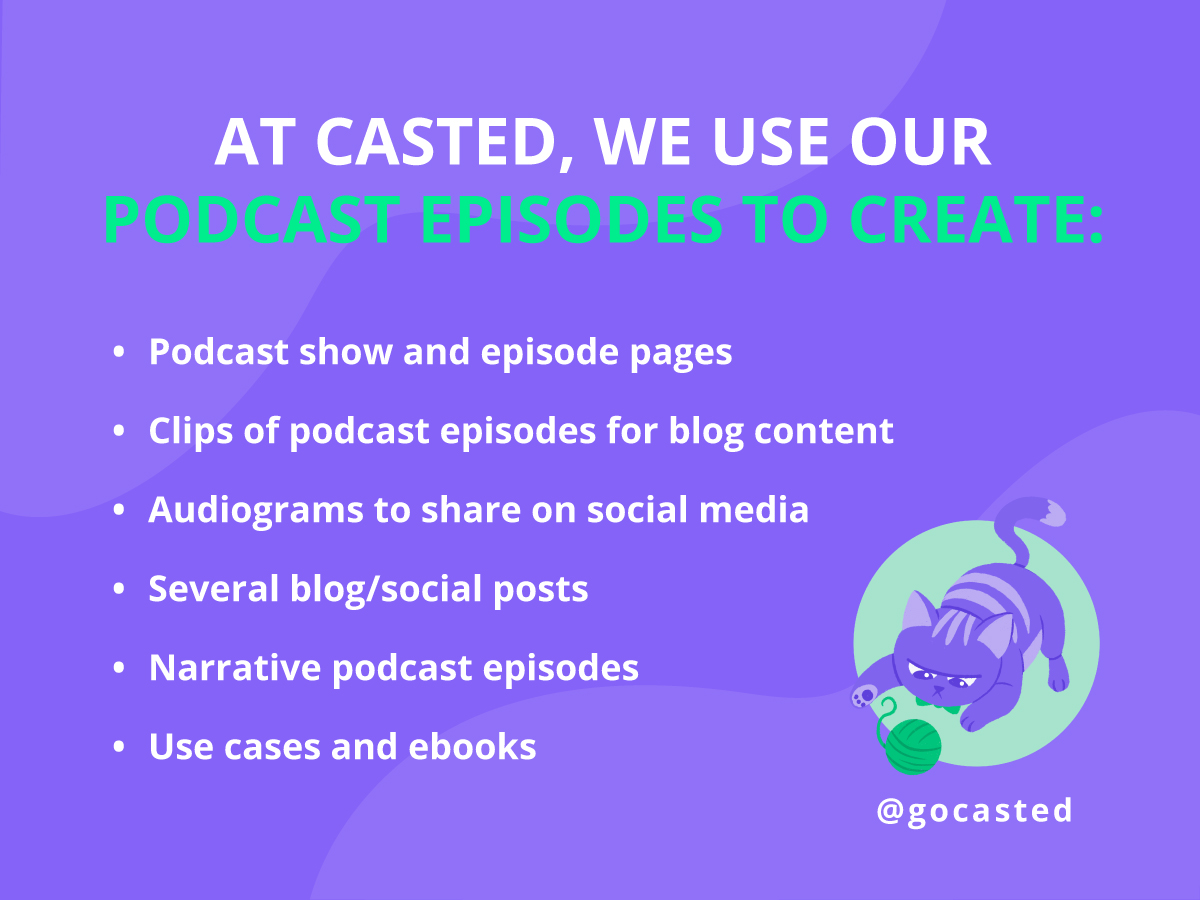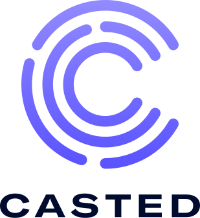Proving the value of content marketing to your CEO is nothing new in B2B companies. As content marketing has evolved, so have the metrics associated with it. In the past, marketers may have dreaded the request for metrics due to a lack of understanding from management about how fast content marketing should work or by the lack of proper tools to fully measure their content. But today, you’re a savvy marketer with all the right tools and strategies with a boss who is all-in on content marketing, so you’ll gladly accept the challenge.
Except now you have to prove the value of content that still wields that new car smell — podcasting. Sure, it is new territory in the content marketing realm, but it’s come a long way from being an untraceable (aka unattributable) form of marketing.
If you treat your B2B podcast like other content in your strategy with trackable data, you can easily show attribution and ROI to your higher-ups.
Before we dive into talking about metrics and results, let’s tell you a quick story about our founder, Lindsay...
A “Successful” Podcast (in Vanity Numbers)
In marketing, you hear about vanity numbers and metrics that give you a false sense of success in your results. In podcasting, those basic metrics are downloads and listens and are often the only metrics available. And it’s true — downloads and listens may give you an idea of the reach of your show, but they tell you nothing about whether you’re reaching and engaging the right audience. That’s what conversions are for (the numbers your CEO is going to inquire about).
A perfect example of this is when our founder, Lindsay Tjepkema, started and grew a podcast for a global enterprise SaaS company. She did everything right — hosted interviews with customers, partners, prospects, and known influencers. They also amplified the podcast at events and in content, tied episodes into their email campaigns and sales cadences, and even had shirts and stickers (because who doesn’t love a little swag).
Within months, they saw huge growth in episode downloads, and listenership was booming. Even comments were flowing in, confirming fans enjoyed the show.
So it was a no-brainer that the podcast was having a positive impact on their brand. They had a growing audience — a B2B marketer’s dream. But it didn’t take long to burst this bubble. One of Lindsay’s leaders asked about the show, and she relayed how they were exceeding goals. Rather than being thrilled, the conversation turned to where it always goes... metrics.
(By the way, there’s more to this story, which you can read here!)
Stop Relying On Downloads and Listens as Key Metrics
Getting thousands of downloads and listens on your podcast episodes is amazing. But without tracking more meaningful metrics that matter, then that can spell trouble for the future of your show.
A podcast can be shared in its original form, in transcripts, in short clips, through blog posts, and even in a video format. It’s such a versatile piece of content. But it’s just that, content. So why are we treating it any differently than the rest of our content marketing arsenal when it comes to understanding performance?
We expect to understand more about each piece of written content we create than just unidentified traffic. It’s time we also start expecting more from our podcast content than just downloads and listens.
Instead, you need to focus on the metrics that show how your podcast is helping you hit target goals. Because after all, if you’ve created a podcast you likely have goals around it that impact greater business goals right? So let’s start looking at how your podcast is impacting your bigger strategic initiatives.
The problem we run into with moving beyond those metrics, however, is that if you’re using Apple and other podcast apps, then you likely only have access to the data they provide. And spoiler alert, they only provide data on downloads and listens. Look into true podcast analytics, like Casted's Insights which provides firmographic data about who's listening or viewing your show.
It all comes back to being the owner of the platform you publish to (vs. relying on third-party mediums). So to combat this, we recommend hosting your podcasts on your website. This way, you can own your audience and gather all the data you need to connect your podcast episodes to your campaigns.
Start Treating Your Podcast as the Content Centerpiece it is
Something that seems to be highly overlooked when we talk about the value of podcasts is the quality of content that podcasts produce. For most B2B brands, their podcast is a way to showcase their internal expertise on subjects that are important to their audience through interviews with experts in their industry, customers, prospects, partners, and more.
The value of this content is unmatched. It’s unique to your brand, and when interview or narrative podcasts are done right, they provide entertaining content for your target audience and can serve several areas of the business.
But it doesn’t stop with a podcast episode — your episode is just the beginning. Your podcast can create top-quality content that can serve every channel, campaign, and area of your business. In fact, we believe that the conversations you’re having on your podcast are so beneficial and fruitful, they should serve as the centerpiece of your content marketing strategy. And at Casted, they do.  We use our episodes of The Casted Podcast to create:
We use our episodes of The Casted Podcast to create:
-
- Podcast show and episode pages (with transcripts for SEO and user preference)
- Clips of podcast episodes for blog content
- Audiograms and videograms to share on social media
- Several blog/social posts – really wring out that audio and video content into written content
- Narrative podcast episodes
- Use cases and ebooks
By breaking down our content into several pieces to distribute across our owned channels, we can identify what’s driving more traffic (is it our blog pages or podcast pages?) and what content is converting best.
Our Customer Success and Sales team also uses our podcast content as a way to inform, educate, and engage our customers and prospects through their own personal outreach.
We also tag each piece of content and social post to campaigns centered around podcast seasons. Every podcast season and podcast-related content we create is tagged using our marketing CRM. Doing this also allows us to track what podcast content is influencing pipeline, how podcast listens impact our buyers’ cycle, and more.
So having the right tools in place is critical. This makes it easier to run campaigns against our podcasts, including social, email, blog, and so on.
Now, On to Convincing the CEO Your B2B Podcast Is a Growth Engine
We’ve talked about why you should move beyond vanity metrics and outlined some ways to tap into podcast metrics by utilizing your owned channels. But how exactly are you going to take this information and convince your CEO (or another nay-sayer) that podcasting is a worthy investment for growing your brand? The key question you need to answer is how to measure podcast success.
Take the time to really consider what the goals around your podcast are. If your main goals are around growing brand awareness, the way you measure success could in part be looking at how you’re growing your listener base. But if your goal is to create higher quality and engaging content for your audience, you might be looking at how podcast content is driving engagement and conversions to gauge success.
Don’t stop there. Look for opportunities to map those goals to bigger business goals. CEOs and other leaders don’t want to crush your creativity and ability to be innovative in your work. But they do want to know that the investments you’re making are contributing to the goals your team and business is setting.
Help them see your podcast’s impact by showcasing things like increases in your subscriber base, number of leads generated through podcast-driven content, and even pipeline influenced by your show (amongst others). Additionally, make sure to include how your podcast is serving as a driving factor behind your content marketing strategy and is even impacting other areas of the business.
If you don’t have a podcast yet and would like to convince your CEO it’s time to build one, then check out some use cases highlighting how other brands are maximizing conversions and revenue (as well as a ton of other really amazing things).
Getting the Tools to Simplify B2B Podcast Attribution
It’s not easy tying traffic and conversions to your B2B podcast. This is why we suggest using tools to simplify the process. Casted is a podcast marketing platform we created specifically for B2B marketers and podcasters like you. It enables you to upload your podcast content, turn it into clips, audiograms, videograms, and embedded podcast players and share it with your entire company. Plus, you can track how it performs wherever you place it (emails, social, blog posts, etc.).
We help B2B podcasters remove the guesswork from evaluating podcast success. For more on a podcast marketing strategy for your business, download The Marketer’s Complete Guide to B2B Podcast Strategy. If you’re ready to see the Casted platform in action, reach out to us — we have so much to show you! And if you’d like to see how a podcast can help grow your business, subscribe to The Casted Podcast on Apple Podcasts and Spotify.






